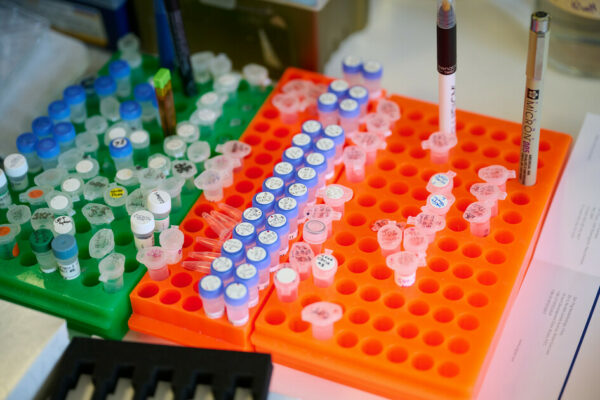We fund pioneering research for better treatments to improve people’s lives today, and to transform those of future generations.
Filter results
Research condition
Research type
Geographic Location
Improving the delivery of treatments for collagen VI-related muscular dystrophy
Professor Zhou and team is developing a new way for treatments for collagen VI-related muscular dystrophy to reach muscle cells, helping to treat the condition and potentially reduce side effects.
Developing next-generation therapies for LMNA-related congenital muscular dystrophy using ‘mini muscle’ models
Professor Tedesco and team are using mini muscles that mirror the changes seen in LMNA-related congenital muscular dystrophy to test potential new treatments.
Investigating if a gene change can protect muscles in merosin-deficient congenital muscular dystrophy
Professor Muntoni is investigating if making a small change to the MEF2A gene can help protect muscles and reduce the severity of merosin-deficient congenital muscular dystrophy (also known as LAMA2-RD).
Investigating passive movement in people with glycogen storage disease
Dr Hennis and team are investigating whether devices, which move parts of the body without the individual actively being involved, could help people with glycogen storage disease exercise safely.
Understanding the factors that impact quality of life in people with FSHD and LGMD
Dr Christopher Morse and his team from Manchester Metropolitan University will work with people affected by FSHD and LGMD to understand the factors that affect their quality of life, with the ultimate goal of developing ways to improve it.
Using brain imaging to study myotonic dystrophy
Dr Vivekananda will look at brain activity in people with type-1 myotonic dystrophy to determine measurements that are useful for prognosis and clinical trials.
Understanding liver disease in X-linked myotubular myopathy
Professor Dowling and team are using models to understand why, how and when liver disease occurs in some children with X-linked myotubular myopathy.
Understanding how the brain is involved in Duchenne and Becker muscular dystrophy
Dr Hermien Kan will use brain scans, assessments of brain function and behavioural data to understand more about how Duchenne and Becker muscular dystrophy impacts how the brain works.
Developing a molecular patch for collagen VI-related muscular dystrophy
Professor Carsten Bonnemann and his colleagues from the National Institute of Health (US) aim to develop a new kind of molecular patch for Collagen VI-related muscular dystrophy that can be delivered using adeno-associated virus (AAV).
Understanding the biology underlying a form of congenital muscular dystrophy
This PhD studentship, to be supervised by Dr Laura Swan at the University of Liverpool, will investigate the structure and function of INPP5K, a protein that is important in congenital muscular dystrophy.
LifeArc Centre to Treat Mitochondrial Disorders
The LifeArc Centre for Rare Mitochondrial Diseases (LAC-TreatMito), led by Professor Patrick Chinnery at the University of Cambridge, aims to improve diagnostics and develop treatments for mitochondrial diseases.
Improving accessibility of bone density scanning for wheelchair users living with muscle wasting conditions
Dr Jarod Wong will lead a study involving people living with muscle wasting conditions and healthcare workers to improve the accessibility and performance of bone density scanning to make monitoring weak bones more straightforward.
